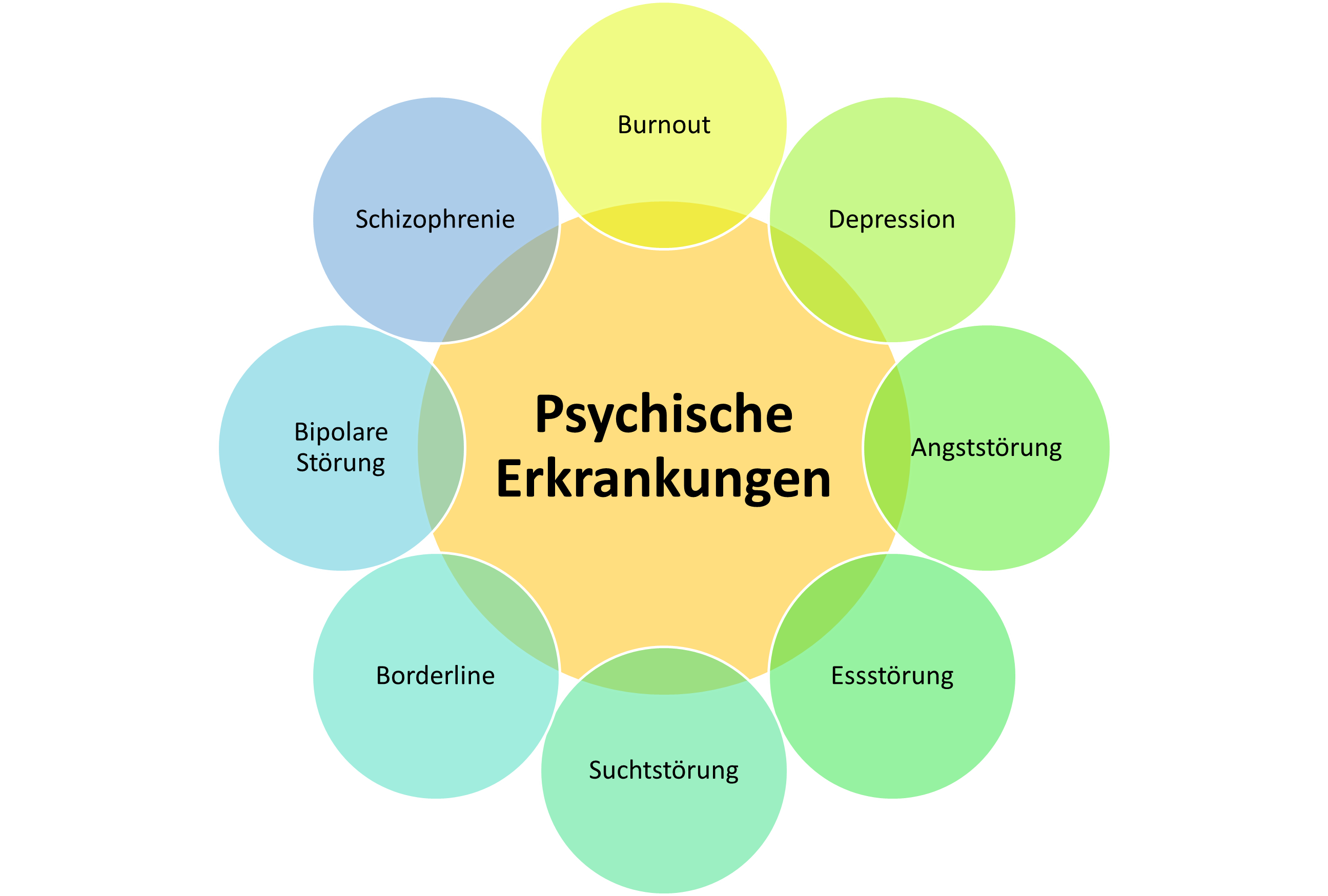Mental Illnesses - An Overview
mental illnesses and their symptoms

Every one of us knows it: bad mood, we don't really wake up all day long and we would like to lie on the sofa for 24 hours and pull the covers over our heads. Everyone has a bad mood and listless days from time to time. This is completely normal.
However, if our mood doesn't improve, even though we "fight" it, it affects our everyday life, our professional life and our social environment, this can indicate serious signs of a mental disorder.
In this article we would like to name some mental illnesses and get an overview.
Burnout
People who suffer a so-called burnout are literally burned out. They no longer have the energy or drive to get their work done, and they lack the strength for normal everyday things such as cleaning the apartment, cooking or maintaining social contacts.
The burnout disease is very complex and not only manifests itself in psychological form. Physical exhaustion is also a big factor.
Symptoms can include extreme exhaustion, tiredness, difficulty concentrating, mood swings and reduced performance. Stress and pressure are the most common causes. The urge for perfectionism and pushing one's own performance can also lead to burnout.
If left untreated, burnout can lead to permanent inability to work and those affected can develop depression. More on this
Depression
We speak of depression when a person shows increased signs of sadness, listlessness, hopelessness and tiredness. A noticeable reduction in zest for life is also a symptom. Effects of untreated depression can be loss of quality of life, inability to work up to early retirement and, in the worst case, suicide.
A distinction is made between depression
- of unipolar depression
- of seasonal depression (winter depression)
- chronic depressive mood (dysthymia)
- of bipolar depression (bipolar disorder)
Anxiety Disorder
Angst zu haben ist ein natürlicher Schutzmechanismus. Dieses Gefühl resultiert aus der sogenannten "Kampf- oder Fluchtreaktion". Unsere Vorfahren brauchten das Gespür für Gefahr, um in Stresssituationen rasch handeln und überleben zu können.
Fear is a natural defense mechanism. This feeling results from the so-called "fight or flight response". Our ancestors needed a sense of danger in order to be able to act quickly and survive in stressful situations.
In our modern world, of course, this is (usually) no longer necessary. However, the basic instinct has remained.
However, when we feel fear and panic for no reason, it is called an anxiety disorder. In this case, without reason means that the fear is very high and strongly felt, although there is no real threat. The symptoms prevent normal participation in social events.
Symptoms of an anxiety disorder can include very high levels of nervousness, dizziness, sweating and insomnia.
Eating Disorder
Eating disorders are also a mental illness. They usually arise as a result of psychosocial stress, experienced trauma or bullying. This can result in a disturbed relationship with one's own body.
Some of the most well-known eating disorders are:
- Bulimia (eating disorder)
- Anorexia nervosa
- Binge Eating
For people affected by an eating disorder, thoughts revolve almost constantly around food. Symptoms can include fear of gaining weight, secret eating, compulsive weight control, forced vomiting and binge eating.

Addiction Disorders
If the craving for something such as alcohol, tobacco, marijuana or synthetic drugs is uncontrollable and so-called withdrawal symptoms occur when not taking it, we speak of a dependency. However, there is not only addiction to legal or illegal intoxicants. We can also become addicted to sports, food, gambling, or betting.
The addiction results from a misdirection of the reward system in the brain. Various messenger substances are released, which trigger a high (feeling of intoxication) and well-being. The brain remembers which substances trigger these feelings and demands more and more of them at ever shorter intervals.
Borderline
People with borderline personality disorder are unable to control their emotions. Their personality is unstable as they suffer from frequent and severe mood swings and are extremely impulsive. This can lead to intense anxiety disorders and fear of loss.
Many sufferers hurt themselves because they see no other way to release their tension in the body. The risk behavior of people with borderline syndrome is also increasing. These types of self-destruction are usually not attempts at suicide, but rather desperate attempts for those affected to be able to regulate and control their feelings for a brief moment.
Bipolar Disorders
Bipolar disorder is one of the so-called affective disorders. Extreme fluctuations are characteristic of this disease. These can affect not only the mood, but also the urge to move and motivation.
Sick people always experience an uncontrolled alternation between extreme highs (mania) and extreme lows (depression). Weeks or months can pass between these extremes without symptoms appearing.
In mania, those affected are extremely active, exuberant, but also irritable, restless and erratic.
In depression, they can be extremely sad, listless and sleepless, among other things.
There are also different manifestations of bipolar disorder, so that there is no uniform clinical picture.
Schizophrenia
The thoughts, feelings, and perceptions of people with schizophrenia differ greatly from those of healthy people. But language and personality are also perceived differently.
Those affected may develop symptoms such as delusions. Other signs may include hallucinations (hearing other voices in your head), movement limitations (sometimes including bizarre postures), extreme mood swings, and trouble speaking and thinking.
There are the following forms of schizophrenia:
- paranoid schizophrenia
- catatonic schizophrenia (unnatural, severely cramped posture or behavior)
- hebephrenic schizophrenia (irritating mood and emotional state behavior)
Schizophrenia can manifest itself in relatively inconspicuous signs, but depending on the clinical picture and course it can also have extreme consequences.
Conclusion
Mental illnesses are very complex and not easy to identify. Without professional and competent help, it is difficult for those affected to deal with it and start a healing process.
As mentioned at the beginning, this is just a general overview of various mental illnesses. We would like to try to devote ourselves more intensively to some of the diseases described above in further articles and to understand them.